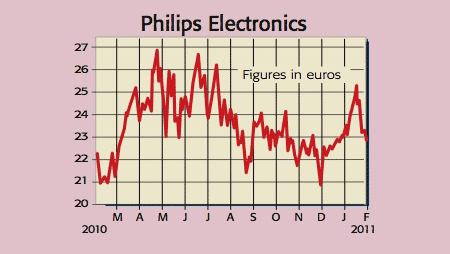Get the latest financial news, insights and expert analysis from our award-winning MoneyWeek team, to help you understand what really matters when it comes to your finances.
You are now subscribed
Your newsletter sign-up was successful
Want to add more newsletters?

Twice daily
MoneyWeek
Get the latest financial news, insights and expert analysis from our award-winning MoneyWeek team, to help you understand what really matters when it comes to your finances.

Four times a week
Look After My Bills
Sign up to our free money-saving newsletter, filled with the latest news and expert advice to help you find the best tips and deals for managing your bills. Start saving today!
Many investors, spooked by either the currency or insolvency risks of countries such as Spain, have ploughed into perceived safe havens, such as gold. However, as a result of this asset rotation, there are now some genuinely world-class companies trading at attractive valuations for patient investors.
Take Philips, the Dutch healthcare (34% of sales), consumer-product (36%) and lighting (34%) organisation. Last week it reported 2010 revenues of €25.4bn, along with an operating profit margin of 10.5%. That's up from 6.4% in 2009, after a ruthless efficiency drive.
Yet partly because the figures didn't quite match up to stretched analyst estimates, the stock was marked down 5%. The biggest gripes were directed towards its flat-panel TV arm, which reported a €130m loss. To me, this reaction seems unfair as the company offers a great long-term growth story.
MoneyWeek
Subscribe to MoneyWeek today and get your first six magazine issues absolutely FREE

Sign up to Money Morning
Don't miss the latest investment and personal finances news, market analysis, plus money-saving tips with our free twice-daily newsletter
Don't miss the latest investment and personal finances news, market analysis, plus money-saving tips with our free twice-daily newsletter
It is the world's largest operator in the expanding home healthcare, men's shaving and lighting sectors. It is also the number-three player in medical scanners. Its technology base is protected by around 50,000 patents, while a third of its turnover is derived from emerging markets the aim is to lift this to 40% by 2015. What's more, the brand name is internationally recognised and at the last count was valued by Interbrand at $8.7bn (or €6.80 a share).
The group's heritage is steeped in successful launches of new innovations. That's why the firm continues to invest heavily in research and development. In particular, Philips wants to take advantage of environmental awareness (eg, power-saving LEDs) and the unmet need for domiciliary medicine as populations age.
Philips Electronics (Euronext: PHIA), rated a BUY by Rabo Securities

Today's performance is just the start of a five-year plan to achieve sustainable improvements in the top line (2% above GDP), profit margins (10%-13%) and capital returns. While shareholders wait for these there's a 3.2% dividend yield to bank (underpinned by net cash of €2bn).
I would value Philips on a sum-of-the-parts basis, prudently assuming the TV division, which generates turnover of €3.15bn, is worthless. I would rate the healthcare, consumer and lighting divisions on earnings before interest, tax and amortisation (EBITA) multiples of 14, ten and 12 respectively. These produce corresponding valuations of €16.6bn, €7.7bn and €10.4bn. After allowing for central overheads of €142m per year and a €1.8bn pension deficit, that all delivers an enterprise value of about €32.7bn, equivalent to €35 per share.
Fine, but are there any catches? There is some tough competition around, particularly from the likes of Sony, Toshiba, Siemens and the Chinese manufacturers. And if there's another recession growth will be affected the lighting unit in particular is tied to the global construction industry. Lastly, for British investors, there are foreign-exchange fluctuations to consider.
All the same, with state-of-the-art science being applied across a broad spectrum of businesses and geographies, the stock rates as a solid buy. Rabo Securities have a price target of €31 per share.
Recommendation: BUY at €22.50
Paul Hill also writes a weekly share-tipping newsletter, Precision Guided Investments
Get the latest financial news, insights and expert analysis from our award-winning MoneyWeek team, to help you understand what really matters when it comes to your finances.
Paul gained a degree in electrical engineering and went on to qualify as a chartered management accountant. He has extensive corporate finance and investment experience and is a member of the Securities Institute.
Over the past 16 years Paul has held top-level financial management and M&A roles for blue-chip companies such as O2, GKN and Unilever. He is now director of his own capital investment and consultancy firm, PMH Capital Limited.
Paul is an expert at analysing companies in new, fast-growing markets, and is an extremely shrewd stock-picker.
-
 Should you buy an active ETF?
Should you buy an active ETF?ETFs are often mischaracterised as passive products, but they can be a convenient way to add active management to your portfolio
-
 Power up your pension before 5 April – easy ways to save before the tax year end
Power up your pension before 5 April – easy ways to save before the tax year endWith the end of the tax year looming, pension savers currently have a window to review and maximise what’s going into their retirement funds – we look at how